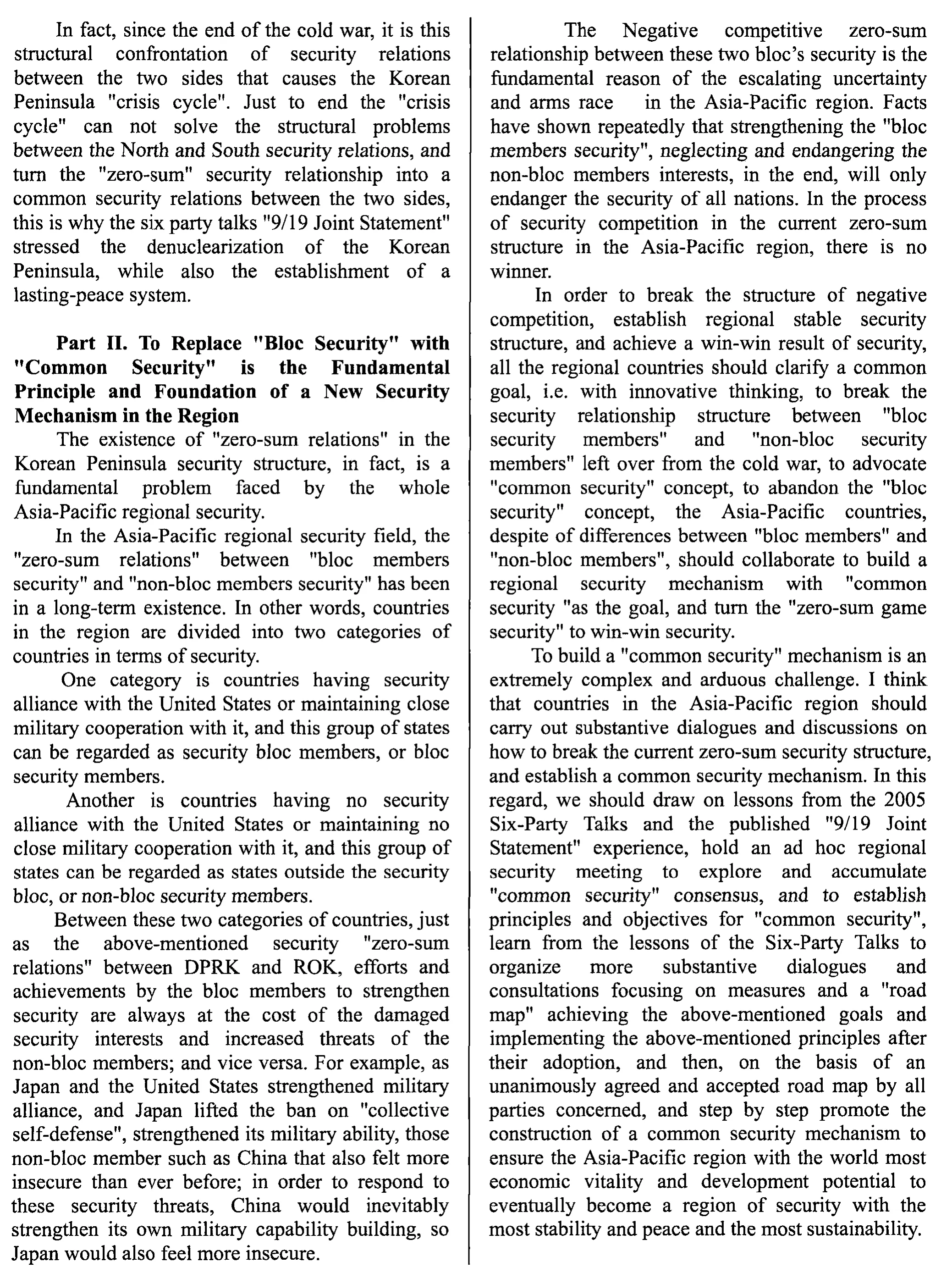Some Observations on an Innovative Structure of The Asia-Pacific Security Mechanism
2014-04-13ByYangXiyu
By Yang Xiyu
Researcher of China Institute of International Studies
To structure a new security mechanism in the Asia-Pacific region is a big and wide-ranging issue,and the Korean Peninsula peace and security issues can be taken as the most prominent issues and sometimes explosive issues in current security throughout the Asia-Pacific region--a microcosm of structural problems of fundamental antagonism presently existing in the current Asia-Pacific security mechanisms.So I would like to proceed from this specific case to briefly read the structural problems of the Peninsula security,and discuss the construction of regional security mechanism conforming to common security interests of countries in the Asia-Pacific region.
Part I.Vulnerability and Root Causes of the Korean Peninsula Security Situation
After the end of the cold war,the Korean Peninsula crises crop up continuously.Since this year,although the Peninsula has witnessed a relaxation trend,the Kaesong industrial park returned to normal operation,the reunion of North-South separated families also been held as planned under the insistence of U.S.-ROK on the military exercises,the intensity of the DPR Korea reactions to the annual U.S.-ROK joint military drill,compared to previous years,significantly reduced.Meanwhile,DPR Korea has also taken a series of positive diplomatic initiatives such as taking a flexible attitude to promote North-South contacts,organizing a team to participate in the Asian Games held in Seoul,and actively seeking the DPRK-U.S.dialogue,actively promoting solution of the hostage problems,and restoring the DPRK-Japan normalization negotiations.These developments seem to herald that this year is the one in which the Korean Peninsula could see a North-South relations restored and improved,dialogue between DPR Korea and the relevant countries can attain progress.
But few people can have enough confidence in the current situation.For the past 20 years,the Korean Peninsula seems to have fallen into a"crisis cycle",the Peninsula will have a crisis after a certain period of time.For example,we have noticed the 1994 nuclear crisis,1998 missile crisis,the second nuclear crisis in 2002,DPR Korea's nuclear test and missile test crisis in 2006,the sinking of the Cheonan,and Yeonpyeong Island incident in 2010,DPR Korea issued a"Jihad"threat creating a crisis of bringing the Peninsula to the brink of war.
The origin of this so-called a"crisis cycle"is still the existing two kinds of abnormal phenomena in the Korean Peninsula:
Firstly,the Korean Peninsula is still in a state of war although the Korean War ended 61 years ago,but legally and technically speaking,the North and the South are still in a state of war,peace on the basis of the"provisional military demarcation line"and"temporary armistice agreement"is a peace full of uncertainty and cannot be anticipated.
Secondly,the Korean Peninsula is still in a state of cold war despite of the ended cold war in the world,while the cold war is still strengthened over the past 20 years in the Korean Peninsula.
In a state of war and the cold war,security relations between DPRK and ROK formed a structural relationship of confrontation,i.e.the"zero-sum relationship".In concrete term,between the two sides,the strengthened security of any side is always based on the damaged security interests or increased threats.For example,when the ROK-U.S.alliance is strengthened,RO Korea feels safer than before,at the same time DPR Korea must feel more insecure than before.While DPR Korea having developed nuclear weapons feels safer than the previously,but RO Korea must feel less safe.The United States provides to RO Korea the"extended nuclear deterrence,"so it feels more secure,but at the same time,DPR Korea must feel less secure,in order to deal with this"more insecurity",it will inevitably further develop the so-called"nuclear deterrence".

杂志排行
Peace的其它文章
- How Can People’s Organization Contribute to Peace,Security and Development
- Asia Needs Common Security
- The Limitation of Western Civilization And the Revival of Oriental Civilization
- Speech at the Round table on Cooperation&Development of Cities along the Silk Road Economic Belt
- Inter-Cultural Exchange is the Light
- Promote Cooperation among Different Communities to Realize the World As a Better Place
